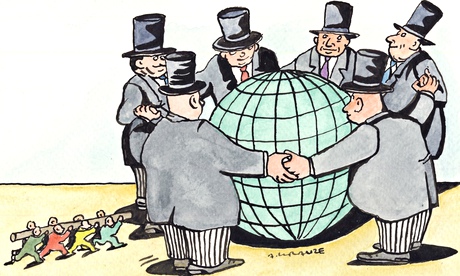
First the bad news. Corporate power, in the shape of multinational corporations, has far outstripped the physical and legal capabilities of the national sovereign government. Of the largest 50 economic entities in the world, eight are corporates. Of the top 175, it is 112. Walmart is larger in terms of income than Austria, South Africa and Qatar. Vodafone and Apple, meanwhile, effectively run larger economies than most of the developing world.
The good news is these companies still have to function within the geographical and legal constraints of sovereign land. Unless they can somehow figure out a way to club together and purchase a friendly, habitable planet to which they can relocate, and do business with Earth from a non-tax-paying offshore world, their power can be curbed. They are, as the economist DH Robertson described as far back as 1937, “islands of conscious power in an ocean of unconscious cooperation”.
But governments are forever telling us that this global corporate entity is in fact an agile, mobile and spry creature; that companies will relocate, taking jobs and tax revenue with them rather than succumb to any legislation that will limit their ability to extract as much profit as possible. Whether it is bankers who will apparently reach for their passports the moment bonuses are taxed at a higher rate, or multinational corporations, governments have surrendered.
Corporates are difficult to control, but they are not uncontrollable. What is lacking is willpower, imagination and supranational solidarity.
Multinational corporations need to be – and can be – broken down along national lines. And we need to ensure there is no friendly habitat for them within close reach. A simple example of how corporate excesses enabled by geographical mobility can be curbed is by forcing conglomerates to pay tax based on their territory of operation. The District Economics Group devised the concept of “single sales factor apportionment” – a mechanism that treats company income as a function of how much is sold in a particular country rather than how much profit is declared in that country; thus it proposes taxing corporations based on where sales are made, not where profits are reported.
So if a company reports 20% of its sales in the UK, for example, it is taxed in the UK on 20% of its worldwide profits. Don’t want to pay tax in the UK? Then you can’t sell there, irrespective of where you declare your profits. This removes the incentive for offshoring, and passes the onus on to the corporation to adapt to the law in each country of operation rather than governments defaulting to whatever convenient arrangement the corporation has made for itself.
But there is also an intellectual barrier to be scaled. Conventional wisdom regards progress in terms of global fluidity and mobility of capital and labour. It may seem counterintuitive to arrest that and revert to some pre-globalisation model. While it is certainly true that multinational business has generally enhanced economic development, this hasn’t been matched by the solidarity of western countries coming together to counterweigh its power. The logical first step to rectify this is for supranational organisations, such as the EU, to spend more time using their collective political heft to legislate en bloc. Last month, for example, Ireland finally bowed to pressure from other EU governments to plug what are known as “double Irish” tax arrangements that enable companies such as Apple and Google and big pharma firms to pay scandalously little tax.
For a time I worked in the private equity large-buyout sector, an industry that invests both money from private investors and public money from pension and sovereign wealth funds in companies that are then sold for a profit, which is subsequently distributed back to the investors. Dealmakers have amassed huge fortunes partly through paying relatively little tax on their share of the profits.
There is, in my experience, a problematic degree of awe, shared by both the right and the left, of this corporate monied species – and, in the UK in particular, occasionally a misunderstanding of how they work. The hysteria surrounding the witch-hunt of the “masters of the universe” private equity barons in 2008 for exploiting a tax loophole to pay “less tax than their cleaners” was a clear example of this. On the one hand, MPs in a parliamentary select committee asked members of the industry ill-informed and posturing questions. On the other, the establishment was very publicly rewarding private equity dons with knighthoods. Despite the public clamour, MPs barely plugged the tax loophole.
Observing this process through the prism of private equity, there is a certain obsequiousness on behalf of politicians behind closed doors. It appears almost impossible for them to cut their business opponents down to size when those opponents come to the meeting in a private jet. This is why political pressure from voters is vital. The soft influence as well as direct pressure that corporate lobbies can wield on politicians in effect cuts the voter out of the decision-making process altogether. It is not only inherently undemocratic, but anti-democratic.
Policymakers have managed to grapple with the notion of monopolies and how they stifle competition and create cartels, but they have not managed to understand the danger of the gargantuan extractive corporation, which can also be damaging to not only economies but also political processes. Even when these companies are state owned, politicians can be cowed and bribed. It recently emerged, for example, that the Brazilian state-owned Petrobras allegedly paid millions of dollars in bribes to politicians, including members of the governing Workers’ Party.
This is why dedicated government figures are needed – not “tsars” or anointed figures from the business world, but a third-party corporate power regulator whose full-time role is to consult with experts and counterparts. It would be called upon to consider how to subjugate the global company to sovereign laws without triggering flight. It might also think, on our behalf, about how these entities can be regulated in poorer developing economies where exploitation and abuse is rife.
For we can no longer afford to be oceans of unconscious cooperation. Only the corporates win.
The good news is these companies still have to function within the geographical and legal constraints of sovereign land. Unless they can somehow figure out a way to club together and purchase a friendly, habitable planet to which they can relocate, and do business with Earth from a non-tax-paying offshore world, their power can be curbed. They are, as the economist DH Robertson described as far back as 1937, “islands of conscious power in an ocean of unconscious cooperation”.
But governments are forever telling us that this global corporate entity is in fact an agile, mobile and spry creature; that companies will relocate, taking jobs and tax revenue with them rather than succumb to any legislation that will limit their ability to extract as much profit as possible. Whether it is bankers who will apparently reach for their passports the moment bonuses are taxed at a higher rate, or multinational corporations, governments have surrendered.
Corporates are difficult to control, but they are not uncontrollable. What is lacking is willpower, imagination and supranational solidarity.
Multinational corporations need to be – and can be – broken down along national lines. And we need to ensure there is no friendly habitat for them within close reach. A simple example of how corporate excesses enabled by geographical mobility can be curbed is by forcing conglomerates to pay tax based on their territory of operation. The District Economics Group devised the concept of “single sales factor apportionment” – a mechanism that treats company income as a function of how much is sold in a particular country rather than how much profit is declared in that country; thus it proposes taxing corporations based on where sales are made, not where profits are reported.
So if a company reports 20% of its sales in the UK, for example, it is taxed in the UK on 20% of its worldwide profits. Don’t want to pay tax in the UK? Then you can’t sell there, irrespective of where you declare your profits. This removes the incentive for offshoring, and passes the onus on to the corporation to adapt to the law in each country of operation rather than governments defaulting to whatever convenient arrangement the corporation has made for itself.
But there is also an intellectual barrier to be scaled. Conventional wisdom regards progress in terms of global fluidity and mobility of capital and labour. It may seem counterintuitive to arrest that and revert to some pre-globalisation model. While it is certainly true that multinational business has generally enhanced economic development, this hasn’t been matched by the solidarity of western countries coming together to counterweigh its power. The logical first step to rectify this is for supranational organisations, such as the EU, to spend more time using their collective political heft to legislate en bloc. Last month, for example, Ireland finally bowed to pressure from other EU governments to plug what are known as “double Irish” tax arrangements that enable companies such as Apple and Google and big pharma firms to pay scandalously little tax.
For a time I worked in the private equity large-buyout sector, an industry that invests both money from private investors and public money from pension and sovereign wealth funds in companies that are then sold for a profit, which is subsequently distributed back to the investors. Dealmakers have amassed huge fortunes partly through paying relatively little tax on their share of the profits.
There is, in my experience, a problematic degree of awe, shared by both the right and the left, of this corporate monied species – and, in the UK in particular, occasionally a misunderstanding of how they work. The hysteria surrounding the witch-hunt of the “masters of the universe” private equity barons in 2008 for exploiting a tax loophole to pay “less tax than their cleaners” was a clear example of this. On the one hand, MPs in a parliamentary select committee asked members of the industry ill-informed and posturing questions. On the other, the establishment was very publicly rewarding private equity dons with knighthoods. Despite the public clamour, MPs barely plugged the tax loophole.
Observing this process through the prism of private equity, there is a certain obsequiousness on behalf of politicians behind closed doors. It appears almost impossible for them to cut their business opponents down to size when those opponents come to the meeting in a private jet. This is why political pressure from voters is vital. The soft influence as well as direct pressure that corporate lobbies can wield on politicians in effect cuts the voter out of the decision-making process altogether. It is not only inherently undemocratic, but anti-democratic.
Policymakers have managed to grapple with the notion of monopolies and how they stifle competition and create cartels, but they have not managed to understand the danger of the gargantuan extractive corporation, which can also be damaging to not only economies but also political processes. Even when these companies are state owned, politicians can be cowed and bribed. It recently emerged, for example, that the Brazilian state-owned Petrobras allegedly paid millions of dollars in bribes to politicians, including members of the governing Workers’ Party.
This is why dedicated government figures are needed – not “tsars” or anointed figures from the business world, but a third-party corporate power regulator whose full-time role is to consult with experts and counterparts. It would be called upon to consider how to subjugate the global company to sovereign laws without triggering flight. It might also think, on our behalf, about how these entities can be regulated in poorer developing economies where exploitation and abuse is rife.
For we can no longer afford to be oceans of unconscious cooperation. Only the corporates win.

No comments:
Post a Comment